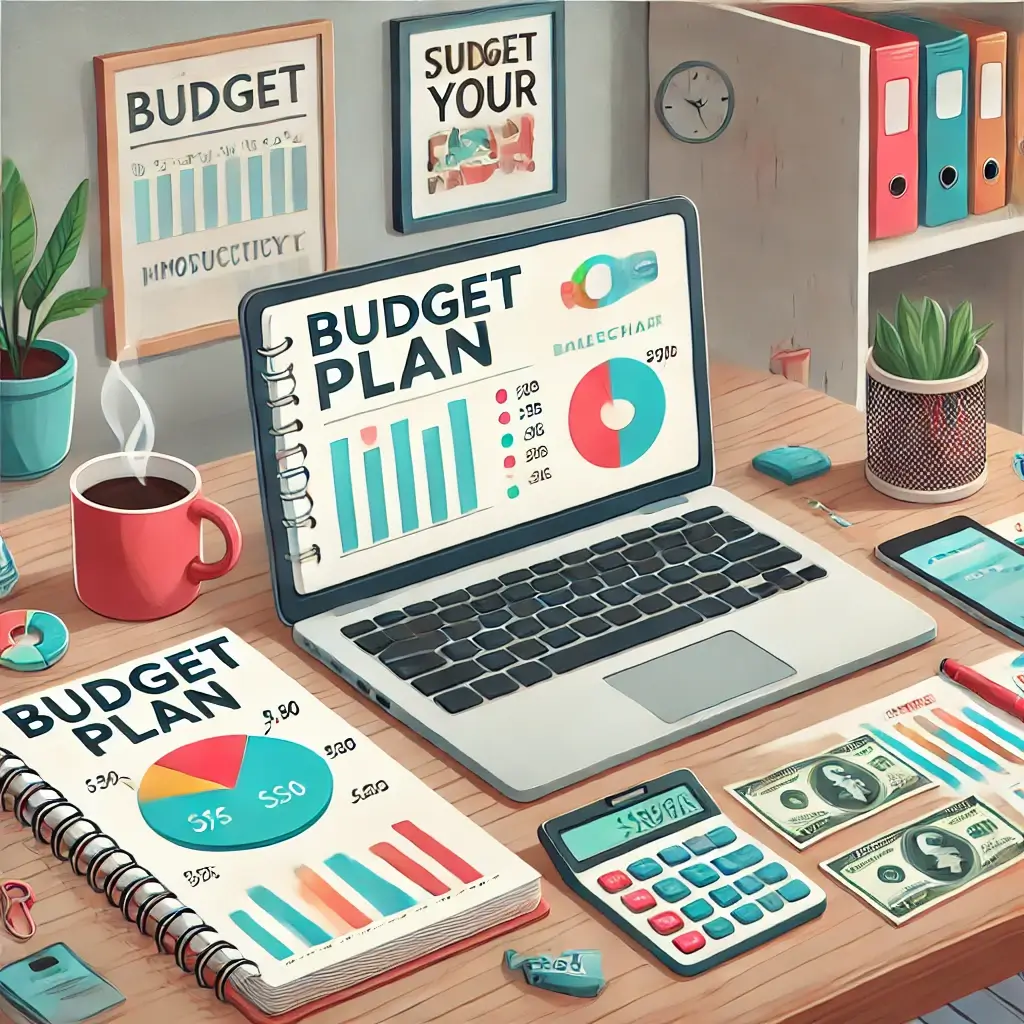What if you could take control of your finances, reduce stress, and build a path to financial freedom? It all starts with mastering the basics of budgeting.
Budgeting is not just for individuals or families with irregular incomes but also for those with regular incomes or even those who are more affluent. So, it is essential to master the basics of budgeting. This will help you avoid financial problems, such as debt cycles.
The primary objective of this article is to first discover the principle of budgeting. Then, give the essential steps to create a budget that works for each case.
What do we mean by the basics of Budgeting?
Budgeting is about achieving an optimal balance between your income, expenses, and future savings. Think of it as a roadmap that helps you reach your financial goals, whether that’s paying off debt, saving for a vacation, or building wealth.
Conversely, the basics of budgeting refer to the key elements that help you manage your finances effectively.
Budgeting is a skill anyone can learn, and it’s never too late to start. If you’re new to budgeting, read our guide on Practical Budgeting Strategies, Tools, Tips, and Challenges. It’s packed with actionable advice to help you get started.
Why Budgeting Matters
Mastering the basics of Budgeting is essential for several reasons:
Wealth Building: You can build long-term wealth by saving and investing consistently.
Financial Control: A budget gives you a clear picture of where your money is going, helping you avoid overspending.
Stress Reduction: Knowing you have a plan in place can reduce financial anxiety. For more details, see our guide, Managing Debt Stress: Simple Strategies for Relief.
Goal Achievement: Whether buying a home or retiring early, a budget helps you allocate resources toward your goals.
Debt Management: A budget can help you pay off debt faster by prioritizing repayments.

Steps to Create and Use a Budget
Creating a budget doesn’t have to be complicated. Follow these steps to build a budget that works for you:
1. Assess Your Financial Situation
Start by calculating your total income and listing all your expenses. This gives you a clear picture of where your money is going. Be sure to include all sources of income, such as your salary, side hustles, or freelance work.
2. Categorize Your Expenses
Break your expenses into fixed (rent, utilities) and variable (entertainment, dining out). This helps you identify areas where you can cut back. For example, you might realize you’re spending too much on dining out and decide to cook more meals at home.
3. Set Financial Goals
Whether saving for a down payment or paying off student loans, having clear goals motivates you. For tips on setting goals, check out How to Set SMART Financial Goals for Success.
4. Create Your Budget
Allocate your income to each category based on your priorities. Make sure to include savings and debt repayment. A good rule of thumb is 50/30/20: 50% for needs, 30% for wants, and 20% for savings or debt repayment.
5. Track and Adjust
Regularly review your budget and make adjustments as needed. Tools like expense trackers can help—learn more in Mastering Expense Tracking: A Guide to Financial Success.
Principles of Budgeting
To make your budget effective, keep these principles in mind:
- Live Within Your Means: Spend less than you earn. This simple rule is the cornerstone of financial stability.
- Prioritize Needs Over Wants: Focus on essentials like housing, food, and transportation before splurging on luxuries.
- Save for Emergencies: Aim to build an emergency fund that covers 3-6 months of living expenses.
- Be Flexible: Life happens, and your budget should adapt to changes in your income or expenses.
- Review Regularly: A budget isn’t a one-time task—it’s an ongoing process.
Budgeting Techniques
There’s no one-size-fits-all approach to budgeting. Here are some popular techniques:
1. 50/30/20 Rule
Allocate 50% of your income to needs, 30% to wants, and 20% to savings or debt repayment. This method is simple and effective for beginners. See a budget calculator below.
2. Zero-Based Budgeting
Assign every dollar a job, so your income minus expenses equals zero. This method ensures you’re intentional with every dollar you earn.
3. Envelope System
Use cash envelopes for different spending categories to avoid overspending. Once the cash is gone, you can’t spend any more in that category.
4. Pay Yourself First
Prioritize savings by setting aside money before paying bills or spending. This ensures you’re building wealth consistently.
5. Japanese budgeting Kakeibo method
The Kakeibo method is a traditional Japanese budgeting technique that encourages individuals to take a mindful approach to their finances. It promotes awareness of spending habits and fosters a sense of financial responsibility.
Maintaining a dedicated notebook or journal allows users to track their income and expenses, categorize their spending, and reflect on their financial goals, ultimately leading to more intentional and informed financial decisions.
This method helps manage money effectively and cultivates a deeper understanding of personal values and priorities, making it easier to align spending with what truly matters in life.
6. Budgeting through bullet journals
Budgeting with bullet journals provides a unique and personalized way to handle finances. It enables people to monitor their income, expenses, and savings in an attractive format. This approach invites users to create their own layouts, making budgeting practical and enjoyable.
Bullet journals can give users better insight into their financial behaviors by adding elements like monthly expense trackers, savings targets, and debt repayment plans. This holistic perspective supports improved decision-making and encourages a sense of responsibility.
Bullet journals’ adaptability allows for ongoing refinement and enhancement of budgeting methods. Users can try out various formats and techniques, ensuring their budgeting practices grow along with their financial objectives and lifestyle changes.
For a deeper dive into these methods, explore our article on Top Budgeting Methods: Incremental, Zero-Based, and Cash Flow.
Budgeting Apps
Technology can make budgeting easier. Apps like Mint, YNAB (You Need A Budget), and PocketGuard help you track expenses, set goals, and manage your finances. These tools are especially useful for beginners who want to automate their budgeting process.
Budgeting for Regular Income
If you have a steady paycheck, budgeting is relatively straightforward. Start by listing your fixed expenses, then allocate funds for variable expenses and savings. The key is to stick to your plan and avoid lifestyle inflation.
Budgeting for Irregular Income
Budgeting with irregular income can be challenging, but it’s not impossible. Start by calculating your average monthly income based on past earnings. Prioritize essential expenses and build a buffer for lean months. For more strategies, read Irregular Income Budgeting: Strategies for Stability.
Budgeting for Students
Students often face unique financial challenges, from tuition fees to limited income. The key is to prioritize essentials like textbooks and rent while finding ways to save on discretionary spending. Check out The Ultimate Budgeting Guide for College Students for tailored advice.
Budgeting for Couples and Families
Budgeting as a couple or family requires open communication and shared goals. Create a joint budget that accounts for household expenses, savings, and individual spending. Regularly review your budget together to ensure you’re on the same page.
Budgeting for the Wealthy
Wealthy individuals often view budgeting as a means to achieve long-term financial growth. They prioritize investments that align with their lifestyle and future aspirations rather than just keeping track of expenses. This strategic approach enables them to allocate resources wisely while maximizing their returns.
In contrast to traditional budgeting methods that focus on strict spending limits, affluent individuals may embrace a more flexible approach. This allows for discretionary spending on luxury items or experiences that enhance their quality of life, all while maintaining their overall financial health.
Moreover, the wealthy often leverage advanced financial tools and advisors to craft personalized budgets that cater to their specific situations. This helps them navigate complex financial landscapes, optimize tax strategies, and preserve their wealth for future generations.
Tools for Budgeting
- Budget Planner: A budget planner helps you organize your finances and track your progress.
- Monthly Budget Template: Use a template to simplify the budgeting process.
- Budget Calculator: A calculator can help you allocate your income and plan for future expenses.
Find out how this budgeting approach applies to your money.
Do you know your “want” categories?
Your 50/30/20 Numbers:
Necessities (50%)
$0.00
Wants (30%)
$0.00
Savings & Debt (20%)
$0.00
Common Budgeting Mistakes to Avoid
- Not Tracking Expenses: Failing to monitor spending can lead to overspending.
- Setting Unrealistic Goals: Be honest about what you can achieve.
- Ignoring Irregular Expenses: Plan for annual or semi-annual expenses like insurance or holidays.
- Not Reviewing Your Budget: Regularly update your budget to reflect changes in income or expenses.
How to Stay Motivated
Budgeting can feel overwhelming at first, but staying motivated is key. Here are some tips:
- Set clear financial goals that align with your personal dreams, whether it’s saving for a dream vacation, purchasing a new car, or establishing an emergency fund. Visualizing these goals can instill a sense of purpose and motivation, making the budgeting process more fulfilling.
- Develop a flexible budgeting plan that can adapt as your financial circumstances change. Adding enjoyable elements, like tracking your progress with colorful charts or treating yourself when you hit milestones, can make the experience more engaging and help you stay motivated.
- Connect with a supportive community or find an accountability partner with similar financial aspirations. Discussing strategies, exchanging tips, and celebrating each other’s achievements can create a positive atmosphere that keeps you dedicated to your budgeting efforts.
Conclusion
Budgeting is the first step toward financial freedom. By understanding the basics of budgeting and applying the strategies outlined in this guide, you can take control of your finances and achieve your goals. Ready to get started? Explore our resources on Debt-Free Living: Strategies and Mistakes to Avoid and take the first step toward a brighter financial future.
For a non-traditional approach to budgeting, see our guide Budgeting by Focus: Maximizing Value, Time, and Savings.
If you love travel, see our guide on budget travel secrets.
Common Budgeting FAQs
Mastering the basics of budgeting often raises questions. Here are answers to common concerns to help you manage your budget effectively.
What if I Have Irregular Income?
Budgeting with irregular income can be challenging. Start by estimating your lowest monthly income and base your budget on that. Prioritize essentials and build an emergency fund to cover lean months. Consider zero-based budgeting to allocate every dollar effectively.
How Do I Handle Unexpected Expenses?
Create an emergency fund for unexpected costs like medical bills or car repairs. Review your budget to identify non-essential areas to cut temporarily. Set aside a small buffer each month to prepare for irregular expenses.
What Should I Do If I Overspend?
Analyze the cause of overspending. Rebalance your budget by adjusting other categories. Learn from the situation, and implement strategies like cash envelopes or spending alerts to avoid repeating the mistake.
How Can I Stick to My Budget Long-Term?
Set realistic financial goals, track your expenses regularly, and adjust your budget as needed. Use budgeting apps like Mint or YNAB for real-time monitoring. Celebrate small wins to stay motivated and make budgeting a consistent habit.
What is the 70/20/10 rule for money?
The 70/20/10 rule is a financial guideline that helps individuals allocate their income for a balanced and sustainable financial life. This principle suggests that 70% of your earnings should go towards essential living expenses and discretionary spending, ensuring you can maintain your lifestyle and cover necessary costs. At the same time, 20% of your income should be saved or invested, helping you build a financial cushion and prepare for future goals. Lastly, the remaining 10% is recommended for charitable contributions or personal development, which fosters a sense of community and encourages self-improvement. This framework promotes a comprehensive approach to managing finances, supporting both stability and growth.
Last updated by Said Hadd, Mars 08, 2025

